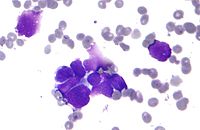
Photo from wikipedia
The 2019 annual congress of the European Society for Medical Oncology (ESMO) took place in Barcelona, Spain from 27 September to 1 October under the tagline “Translating science into better… Click to show full abstract
The 2019 annual congress of the European Society for Medical Oncology (ESMO) took place in Barcelona, Spain from 27 September to 1 October under the tagline “Translating science into better cancer patient care”. Thereby, the major aims of the congress were to translate, as soon as possible, the advances in clinical science into real actions for the best care of patients as well as to highlight the importance of a multidisciplinary treatment approach in modern oncology. The personal highlights for lung cancer treatment were summarized by Horvath et al. [1], concluding that ESMO 2019 fuelled the lung cancer community with inspiring new data contributing to a more individualized treatment approach. This includes fine-tuning of immunotherapy combinations or biomarker-stratified immunotherapy use in the first-line setting for patients without driver mutations. In genetically driven non-small cell lung cancer (NSCLC), the major highlight was the presentation of the long-awaited overall survival data of the FLAURA study, which were however, controversially discussed. New data were also presented on rare subgroups of lung cancer patients with ROS or NTRK alterations, which have emerged as important drivers and further strengthen genetic testing. The ESMO 2019 highlights in bladder and renal cancer summarized by Niedersüß-Beke highlight the impact of the plethora of combination therapies [2]. In addition, new concepts as combination therapies with antibody drug conjugates are evolving in
Journal Title: memo - Magazine of European Medical Oncology
Year Published: 2020
Link to full text (if available)
Share on Social Media: Sign Up to like & get
recommendations!